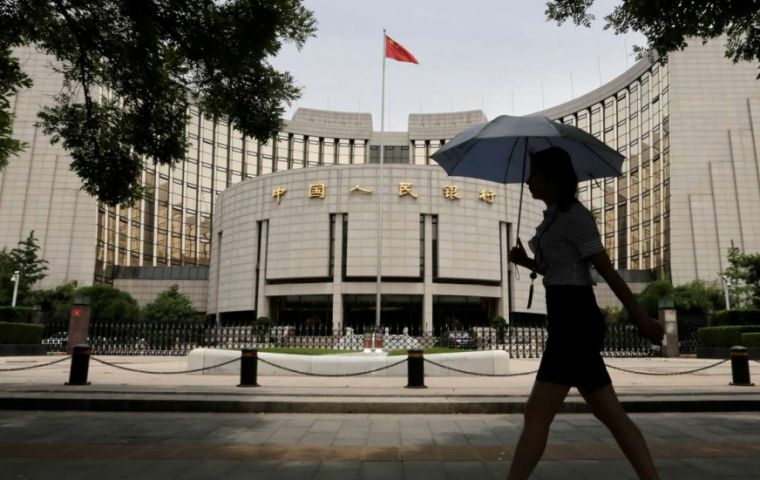MercoPress. South Atlantic News Agency
China injects US$ 83bn to the financial system hoping to prop a declining economy
 The People’s Bank of China (PBOC) said Wednesday’s injection was aimed at ensuring there are ample funds in the financial system
The People’s Bank of China (PBOC) said Wednesday’s injection was aimed at ensuring there are ample funds in the financial system China’s central bank injected a record US$ 83 billion into the country’s financial system on Wednesday, seeking to avoid a cash crunch that would put further pressure on the weakening economy. China’s policymakers are pledging to step up stimulus measures this year and do more to protect jobs as economic growth cools to 28-year lows.
But a raft of measures last year from big rail projects to tax cuts seem to have had little impact so far, with recent data suggesting activity is cooling more quickly than expected.
Wednesday’s open-market operation, the bank’s largest net single-day injection on record, came a day after China’s state planner, central bank and finance ministry all offered reassurances to investors, signaling more spending and other types of policy support.
But shockingly weak December trade data released earlier this week, along with shrinking factory activity, are stirring speculation over whether more rapid and aggressive policy measures are needed to turn the world’s second-largest economy around.
The People’s Bank of China (PBOC) said Wednesday’s injection was aimed at ensuring there are ample funds in the financial system, which is facing strains as tax payments peak in mid-January, and as demand for cash picks up ahead of the Lunar New Year holidays starting in early February.
“The banking system’s overall liquidity is falling rapidly,” it said in a statement.
While sizable injections are common this time of year ahead of the long holidays, the addition was much heftier than usual and follows a large cut in banks’ reserve ratios announced this month, which will free up a total of US$116 billion for new bank lending.
The first stage, a 50-basis-point cut, came into effect on Tuesday. An equal-sized cut is scheduled for Jan. 25.
The move also came a day after money supply data showed several of China’s key credit gauges continue to languish around record lows, despite government efforts to channel more funds to cash-starved companies and lower their financing costs.
While authorities have urged banks to keep lending to struggling firms and even dangled incentives, banks are wary of bad loans after a long regulatory crackdown on riskier lending.
Many businesses, facing slowing sales, are in no mood to make the fresh investments that Beijing is counting on. New medium- and long-term corporate loans last month fell to less than half of average December levels, Nomura noted.
Darkening the picture further, hopes are dimming once again that China will be able to reach a trade deal with the United States in current negotiations. U.S. tariffs have increasingly weighed on Chinese exports in recent months, disrupting its supply chains and dragging down business and consumer confidence.
U.S. Trade Representative Robert Lighthizer did not see any progress made on structural issues during U.S. talks with China last week, Republican U.S. Senator Chuck Grassley said on Tuesday.




Top Comments
Disclaimer & comment rulesCommenting for this story is now closed.
If you have a Facebook account, become a fan and comment on our Facebook Page!